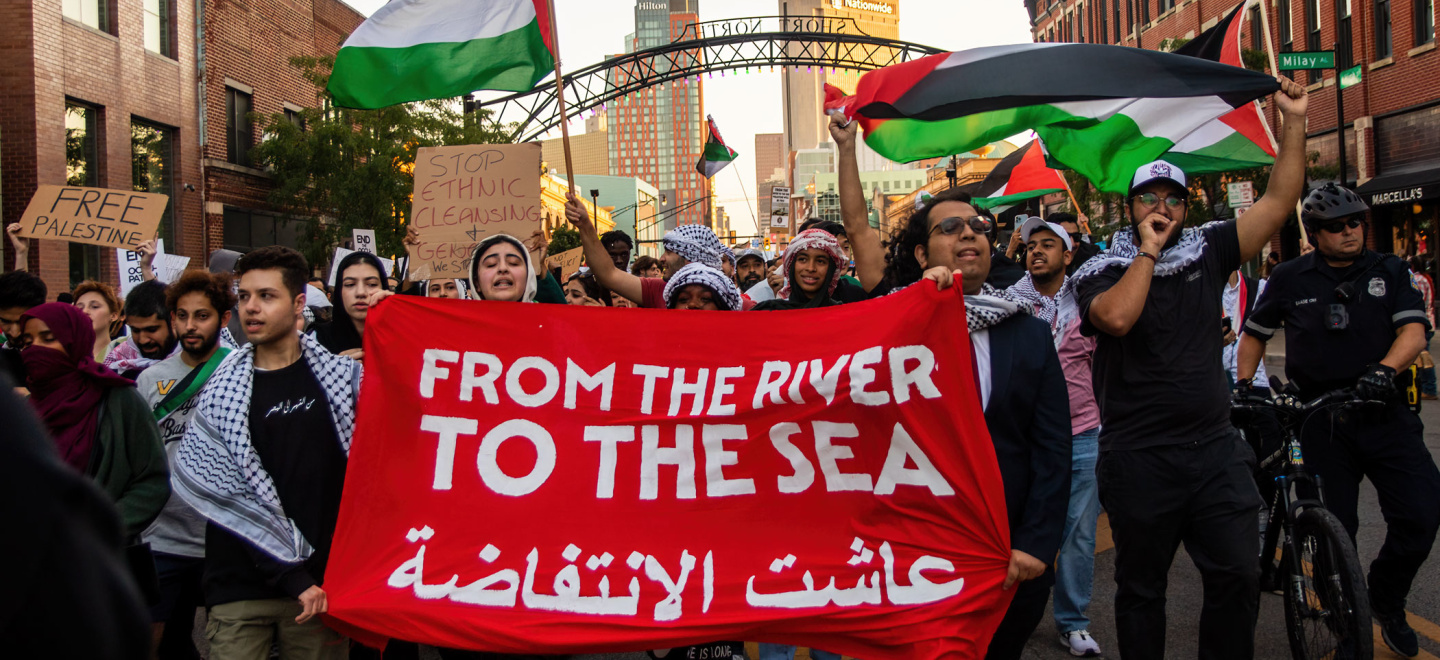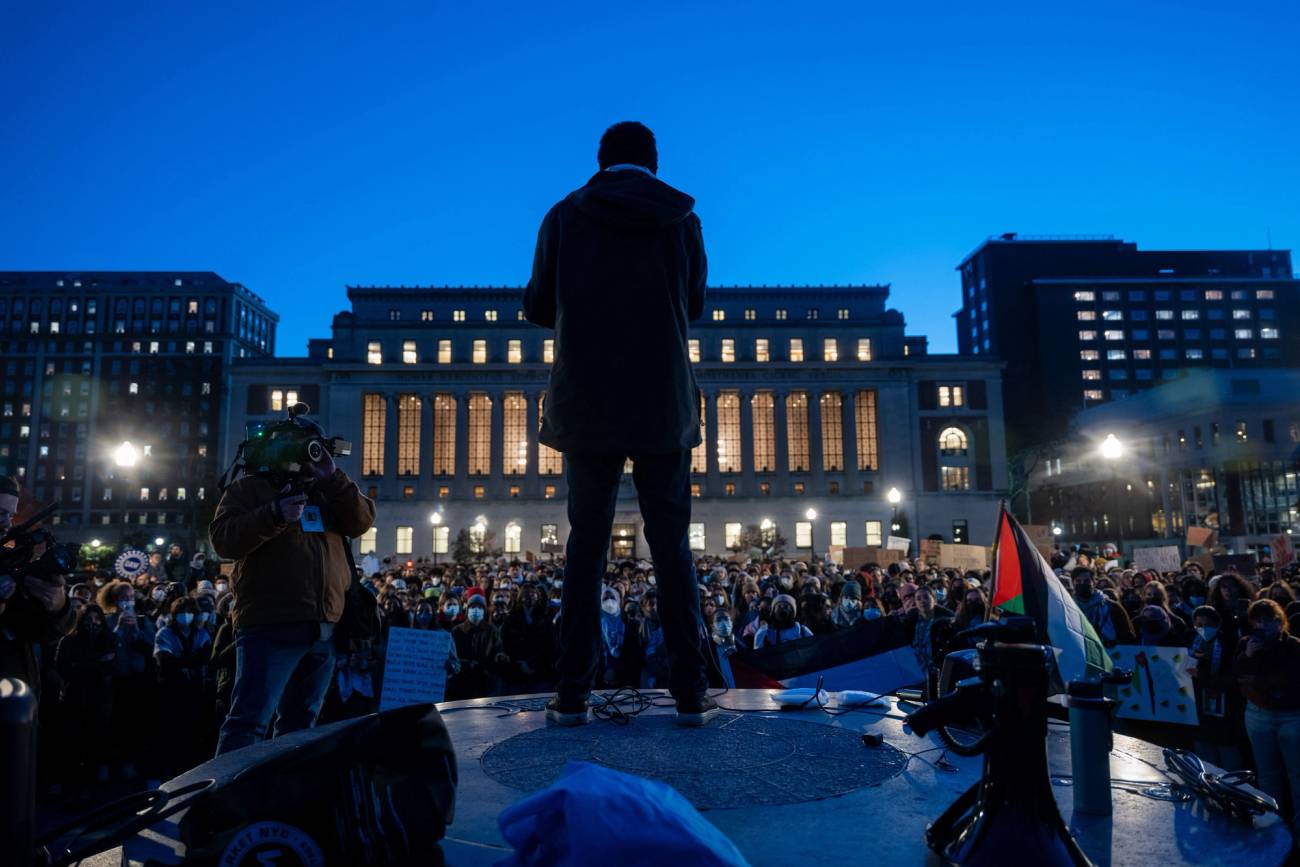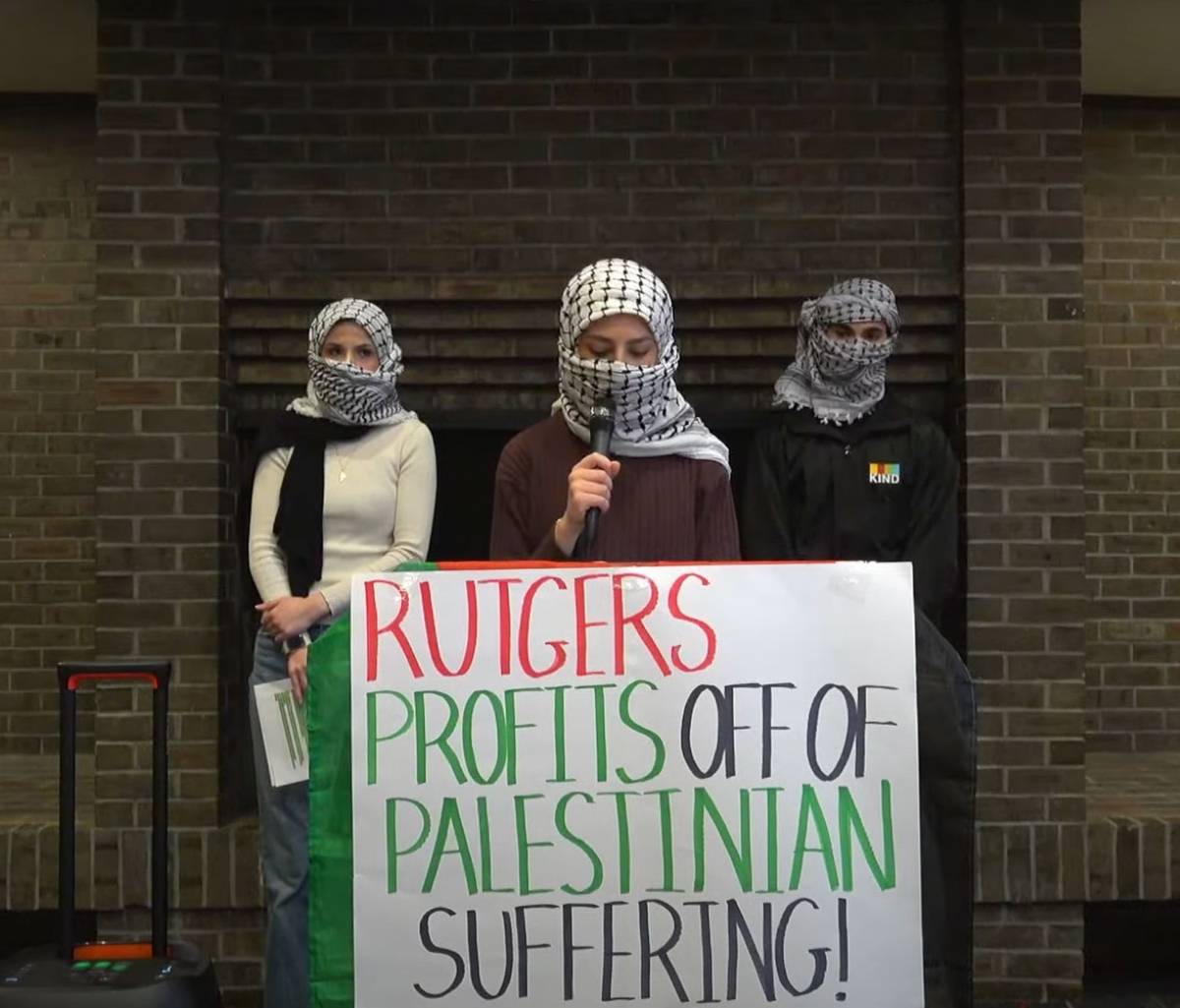 Amerykańska młodzież wzywa do ludobójstwa, które nazywa oporem (Columbus, Ohio, 10 października 2023. (Zdjęcie: Wikipedia)
Amerykańska młodzież wzywa do ludobójstwa, które nazywa oporem (Columbus, Ohio, 10 października 2023. (Zdjęcie: Wikipedia)
 Zdradziecka awangarda intelektualna
Zdradziecka awangarda intelektualna
Andrzej Koraszewski
Bez mała sto lat temu francuski autor pisał, że ci którzy mieli rozwijać życie umysłowe zapoczątkowali „erę politycznej nienawiści”. Julien Benda w 1927 roku, sześć lat przed wyborczym zwycięstwem Hitlera w Niemczech, obawiał się, że również we Francji elity intelektualne przygotowują pole do zwycięstwa skrajnej prawicy.
Brytyjski historyk Niall Ferguson pisze na łamach „Free Press” o zdradzie dzisiejszych intelektualistów. Autor stwierdza, że po stu latach jesteśmy właściwie w tym samym miejscu, z tą różnicą, że dzisiejsi intelektualiści promują głównie lewicowy totalitaryzm.
Prawda, że Benda obawiał się głównie rasistowskich i nacjonalistycznych sentymentów, ale już wtedy zaangażowani intelektualiści byli rozdarci między romantyzmem nazizmu i romantyzmem komunizmu. (Kiedy nieco ponad ćwierć wieku później ukazał się Zniewolony umysł Czesława Miłosza, wielu czytelników na Zachodzie, uznało jego książkę za kontynuację rozważań Bendy.)
Ferguson pisze, że krzyczy o tej zdradzie intelektualistów od dziesięciu lat. (Kiedy podczas wywiadu zapytano go dlaczego akurat od dziesięciu lat, powiedział, że wstrząsem było dla niego odwołanie przez uniwersytet wykładu jego żony, Ayyan Hirsi Ali.) Istota tej zdrady polega na uleganiu wrzaskliwym guru przebudzonych postępowców, zwolennników „krytycznej teorii rasy” i apologetów islamskiego ekstremizmu.
Ferguson o tym nie pisze, ale zastanawiający jest fakt, że dzisiejsza lewicowa intelektualna awangarda znalazła sobie „nowy proletariat” w skrajnie prawicowym, religianckim, patriarchalnym i autorytarnym islamie, którego polityczne struktury rodziły się równolegle i w ścisłym sojuszu z niemieckim nazizmem i w którym nazistowskie idee przetrwały upadek nazizmu i są nadal kultywowane.
Początkowo jego ostrzeżenia przed głębokim kryzystem całego amerykańskiego systemu oświaty wyższej traktowano sceptycznie, wręcz podejrzliwie, bo też sprzeciw przeciwko ruchowi na rzecz różnorodności, równości i inkluzywności wydawał się żałosnym płaczem konserwatysty.
Prawdziwa twarz amerykańskich elit intelektualnych ujawniła się z całą mocą po 7 października, kiedy reakcją studentów i profesorów na ludobójcze działania Hamasu było masowe poparcie dla „Palestyńczyków”.
Ukryte wcześniej sentymenty z dnia na dzień przerodziły się w już zupełnie otwarty antysemityzm, skierowany przeciw każemu, kto odmawia udziału w orgii nienawiści.
Czy obrona wolności słowa może stać się bronią w ręku obrońców nietolerancji i siewców nienawiści? Piątego grudnia 2023 rektorki trzech czołowych amerykańskich uniwersytetów zeznawały przed Komisją ds. Edukacji Izby Reprezentantów. Elise Stefanik zadawała im wielokrotnie to samo pytanie: „czy wzywanie do ludobójstwa Żydów narusza zasady uniwersytetu”. Wszystkie trzy rektorki konsekwentnie odpowiadały, że jak długo nie dochodzi do fizycznej przemocy, to nie narusza. Jak pisze Ferguson ta odpowiedź była technicznie poprawna, pozostawiała jednak tak wiele do życzenia, że wywołała trzęsienie ziemi.
Ferguson przywołuje esej Maxa Webera z 1917 roku Nauka jako powołanie, w którym niemiecki socjolog pisał o konieczności oddzielenia nauki uniwersyteckiej od polityki i wyrzucenia z uniwersytetów „proroków i demagogów”.
Dlaczego stało się wręcz odwrotnie? Ferguson przypomina:
„Sto lat temu, w latach dwudziestych XX wieku, zdecydowanie najlepsze uniwersytety na świecie znajdowały się w Niemczech. W porównaniu z Heidelbergiem i Tybingą Harvard i Yale były klubami dla dżentelmenów, w których studenci poświęcali więcej uwagi piłce nożnej niż fizyce. Ponad jedną czwartą wszystkich nagród Nobla w dziedzinie nauk ścisłych w latach 1901–1940 przyznano Niemcom; tylko 11 procent trafiło do Amerykanów.”
Niemieccy intelektualiści żywili tęsknotę do charyzmatycznego przywódcy, który zapewni im wielkość. Julien Benda zwracał uwagę na paskudny charakter dziewiętnastowiecznego romantyzmu odrzucającego empiryczny racjonalizm. Amerykański pisarz Mark Lila oskarżał przed laty intelektualistów o stawanie się duchową milicją zagarniającą masy do nowych potworności.
W 1987 roku brytyjski krytyk literacki i historyk literatury angielskiej John Carey opublikował książkę pod tytułem The Intelllectuals and the Masses: Pride and Prejudice Among the Literary Intelligentsia 1880-1939.
Pisał w niej, że czegoś takiego jak masy nie ma, widzimy tłum, ale idea mas z definicji odczłowiecza jednostkę. Intelektualistów brytyjskich końca XIX wieku i pierwszej połowy XX wieku charakteryzowała otwarta pogarda dla mas. Ta pogarda była związana z lękiem przed przeludnieniem, który prowadził do dehumanizacji „mniej wartościowych” i gloryfikacji masowej eutanazji. Carey cytuje całą plejadę pisarzy otwarcie wzywających do mordowania, przywołuje list D.H. Lawrence’a 1908 roku:
„Gdyby to ode mnie zależało zbudowałbym śmiercionośną komorę, wielką jak Pałac Kryształowy. Przed nią stałaby wojskowa orkiestra, grająca łagodną muzykę, i jasno oświetlony kinematograf; poszedłbym do zaułków i na główne ulice i przywiódłbym ich wszystkich, wszystkich chorych i kulawych i okaleczonych; prowadziłbym ich spokojnie, a oni rzucaliby mi uśmiechy w zmęczonym podziękowaniu: a orkiestra grałaby łagodnie »Alleluja«” .
D.H. Lawrence nie był w żaden sposób odosobniony. Ten zapał do mordowania ludzi zbędnych był na literackim Olimpie właściwie powszechny. Podzielali go tacy pisarze jak W.B. Yeats i G.B. Shaw oraz Aldous Huxley.
John Carey pisał, że Hitler nie był tępym prymitywem, że czerpał z osiągnięć ówczesnej nauki i literackiego Olimpu.
Niemiecki historyk Götz Aly w książce Europa przeciwko Żydom pisze, że wraz ze zmierzchem wieloetnicznych imperiów pojawił się romantyzm konkurujących ze sobą nacjonalizmów.
Państwo narodowe miało zmienić wspólnotę obywateli we wspólnotę rodaków. Po pierwszej wojnie światowej kraje rodzące się w wyniku upadku imperiów dążyły do etnicznej homogeniczności, próbowały się pozbyć mniejszości z sąsiednich terenów i stanęły przed problemem tej mniejszości, która nie miała dokąd uciekać. Jedną z przyczyn wybuchu antysemityzmu po tej wojnie było dażenie do etnicznej czystości. Jak pisze Aly, plan ostatecznego rozwiązania kwestii żydowskiej powstawał w umysłach niemieckich uczonych i w reakcji na informacje, że inne kraje europejskie będą na tym polu raczej pomagać niż przeszkadzać.
Innym powodem antysemickich skłonności intelektualnych elit była emancypacja Żydów i ich sukcesy na polu nauki. Götz Aly poświęca tej sprawie cały rozdział. Również Ferguson pisze w swoim eseju, że krytycznym czynnikiem upadku niemieckich uniwersytetów był apetyt na pożydowskie stanowiska w nauce.
„Nikt, kto naiwnie wierzy w siłę szkolnictwa wyższego w zaszczepianiu wartości etycznych – pisze Ferguson – nie studiował historii niemieckich uniwersytetów w III Rzeszy. Dyplom uniwersytecki nie tylko nie zaszczepiał Niemców przeciwko nazizmowi, ale zwiększał ich skłonność do jego przyjęcia. Upadek niemieckich uniwersytetów uosabiała gotowość Martina Heideggera, największego niemieckiego filozofa swojego pokolenia, do wskoczenia do nazistowskiego pociągu ze swastyką w klapie. Od 1933 do 1945 był członkiem partii nazistowskiej.”
Czy historia niemieckich uniwersytetów pozwala nam lepiej zrozumieć to, co dziś dzieje się na uniwertsytetach amerykańskich i w wielu innych krajach demkratycznych? Tam mowa szybko przekształciła się w sankcjonowaną przez władzę przemoc.
Wyjątkowo wyrazista lekcja przesłuchania trzech rektorek przez Komisję ds. Eukacji amerykańskiego Kongresu spowodowała nie tylko zmuszenie ich do rezygnacji ze swoich stanowisk, ale wycofanie się wielu filantropów z dotacji na te uczelnie. (Co nie oznacza, że jesteśmy świadkami wygnania z uniwersytetów „proroków i demagogów”, ani nawet ściślejszej kontroli nad wielomiliardowymi dotacjami dla amerykańskiej oświaty przez kraje takie jak Katar, Arabia Saudyjska i inne).
Dzisiejsi zaangażowani intelektualiści nigdy nie uznaliby siebie za spadkobierców intelektualistów potępionych przez Juliena Bendę. Oni są po lewej stronie barykady, są awangardą uciśnionych, podobno bronią wolności słowa i praw człowieka.
Chwilowo ten rodziaj obrony wolności słowa kończy się odebraniem głosu tym, którzy odważają się protestować.
Zdrada intelektualistów nie jest problemem ograniczonym ani do USA, ani do uniwersytetów. W Szwecji imigrant z Jemenu, Luai Ahmed na swoim koncie X (dawniej Twitter) pisze:
„Kiedy 10 lat temu uciekłem od islamizmu w Jemenie i znalazłem dom w Szwecji, byłem niezmiernie wdzięczny. Szwecja zapewniła mi wolności, o jakich nigdy nie marzyłem. Ale jedna rzecz mnie zaszokowała w Szwecji. Podobnie jak wielu uchodźców wierzyłem, że w Szwecji panuje prawdziwa wolność słowa i że obywatele i media mogą swobodnie krytykować wszelkiego rodzaju problemy społeczne, takie jak kultura honoru i islamizm. Ale gdy tylko nauczyłem się języka, odkryłem, że wolność słowa w Szwecji jest ograniczona. Szwedzi, którzy krytykowali islamizm, byli cenzurowani, a nawet nazywani rasistami. Dziennikarze i pisarze, którzy krytykowali niektóre z najbardziej fundamentalnych polityk w kraju, byli zbiorowo nienawidzeni i umieszczani na czarnej liście. Co najgorsze, wielu dziennikarzy nękało i prześladowało dysydentów, a wszystko po to, aby chronić dominującą strukturę władzy w polityce, a robili to nieustannie okłamując Szwedów. Kłamali w kluczowych kwestiach, takich jak islamizm, imigracja, przemoc plemienna, przestępczość i kultura honoru. Relatywizowali różnice kulturowe i karali tych, którzy odważyli się wystąpić przeciwko status quo.”
W samej Ameryce wielu imigrantów ze Zwiazku Radzieckiego z osłupieniem odkrywa zdumiewające podobieństwo atmosfery na uniwersytetach w USA do tego, co tak dobrze znali w ZSRR. Brak wolności słowa, zakrzykiwanie i ostracyzm wobec dysydentów, szykanowanie i zwalnianie z pracy każdego, kto odważa się mieć własne zdanie, a wreszcie przybierający z każdym miesiącem na sile antysemityzm.
Zjawisko zdrady intelektualistów nie jest ani nowe, ani tak zdumiewające jakby się mogło wydawać. Zdumiewa brak umiejętności organizowania się tych, którzy widzą, co się dzieje i wiedzą, do czego to prowadzi.
Zawartość publikowanych artykułów i materiałów nie reprezentuje poglądów ani opinii Reunion’68,
ani też webmastera Blogu Reunion’68, chyba ze jest to wyraźnie zaznaczone.
Twoje uwagi, linki, własne artykuły lub wiadomości prześlij na adres:
webmaster@reunion68.com





